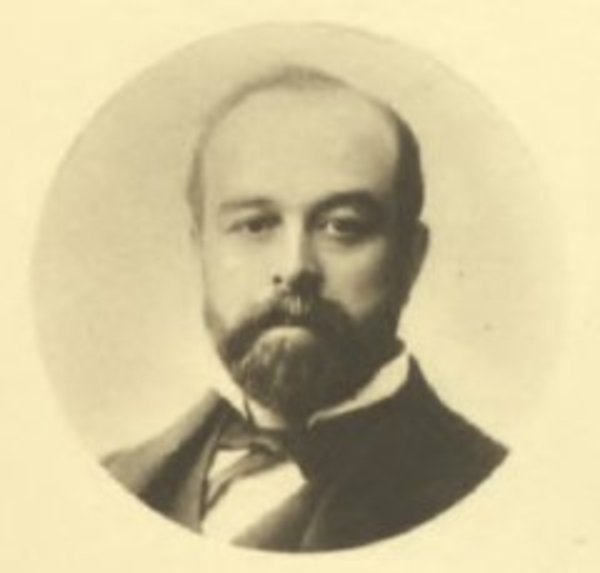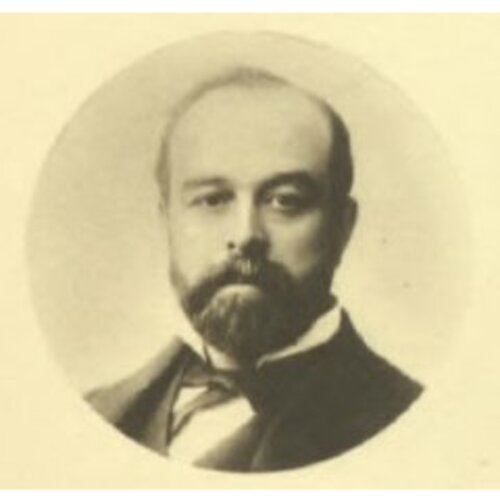
Source: Courtesy of Wikimedia Commons
DAVIE, THEODORE, lawyer, politician, and judge; b. 22 March 1852 in Brixton (London), England, son of John Chapman Davie and Anne Collard Waldron; m. first 28 June 1874 14-year-old Blanche Baker (d. 1876) in Saanich, B.C.; m. secondly January 1884 Mary Alice Yorke in Victoria, B.C., and they had four sons and three daughters; d. there 7 March 1898.
As a young lad Theodore Davie went to sea, but finding the experience distasteful he came to Victoria in 1867 to join his father, who had settled there five years earlier. Like his brother Alexander Edmund Batson Davie*, Theodore studied law in the office of Robert Bishop. After qualifying as a solicitor in 1873, he practised in the Cassiar district during its gold-rush. Following his call to the bar in 1877, he practised briefly in Nanaimo and then returned to Victoria, where he quickly gained a formidable reputation as counsel, particularly in criminal cases. At this time he was already exhibiting the characteristics that would mark his later political career: dogged determination, limitless energy, and intelligence. These traits were never more brilliantly displayed than in the celebrated case of Robert Sproule, whom he defended in 1886 on the charge of murder of a former rival claimant to a valuable mining property. Davie’s persistent and clever, but ultimately unsuccessful, procedural manœuvres brought him into sharp collision with Chief Justice Sir Matthew Baillie Begbie.
Given Davie’s talents, it was inevitable that he should enter politics. First elected to the British Columbia Legislative Assembly in 1882, he represented Victoria and was a supporter of the William Smithe* government. He later supported his brother Alexander, who was premier from 1887 until 1889. In the cabinet of John Robson, Theodore served as attorney general, and he succeeded Robson as premier in 1892. His Redistribution Bill in 1894 gave increased representation to the mainland of British Columbia, and he later provided controversial financial inducements to railways to stimulate economic growth. Davie’s most notable achievement during his tenure of nearly three years as premier was his decision, against much opposition from the lower mainland, to build the spendid parliament buildings in Victoria [see Francis Mawson Rattenbury*]. Although his leanings were undoubtedly conservative, his political career belonged to an era in British Columbia when governments were not formed purely on party lines but consisted of clusters of followers around strong leaders.
Even while premier, Davie continued his law practice with apparently unflagging energy, but by 1895 it was clear that the strain of two careers had taxed his health. He resigned as premier on 2 March to succeed Begbie as chief justice of British Columbia, despite intense lobbying for the post by judge Henry Pering Pellew Crease*. Marking the occasion of Davie’s appointment, the Vancouver World commented on his “astonishing capacity for hard work, his earnest attention to details and his commanding talents.” Sworn in on 11 March, he served not quite three years until his death in 1898 as a result of heart disease, from which he had suffered since his retirement from politics. His judgements, always delivered soon after a case had been argued, are marked by brevity and directness, but are unleavened by humour or irony. He had also been appointed a local judge in admiralty, and his few decisions in that branch of the law are more lively. Perhaps his chief contribution to jurisprudence was the first revision and consolidation of the statutes of British Columbia, an achievement in which he took great pride. The consolidation became effective less than a week before his death. In its obituary, the Victoria Daily Colonist summed Davie up as the “most energetic, practical statesman British Columbia has ever produced.”
Theodore Davie’s more important cases as a lawyer are noted in The British Columbia reports, being reports of cases determined in the Court of Appeal, supreme and county courts, and in admiralty . . . (Victoria), vols.1 (1867–89)–2 (1887–93); his judgements will be found in vols.3 (1893–95)–6 (1897–99). One of his political speeches, Facts and figures: a mass meeting addressed by the premier at New Westminster . . . , has been printed (n.p., [1893?]), as have reports of two others: A rousing meeting . . . ([Victoria, 1889]), which originally appeared in the Victoria Daily Colonist of 13 Aug. 1889; and Opposition slanders refuted . . . (n.p., [1894]).
PABC, Theodore Davie, diary of legal matters, 1890–91; diary of daily events, 1894–96 (mfm.). St Andrew’s Cathedral (Roman Catholic) (Victoria), St Andrew’s Church, reg. of marriages, 14 Jan. 1884. “Electors! look at this!” (broadside, [1894]; copy at PABC). Daily Colonist, 25 March 1867; 8, 12 March 1898. Vancouver World, 22 Feb. 1895. Canadian men and women of the time (Morgan; 1898). CPC, 1891. Kerr, Biog. dict. of British Columbians. Wallace, Macmillan dict. E. O. S. Scholefield and F. W. Howay, British Columbia from the earliest times to the present (4v., Vancouver, 1914), 2: 189–94. S. W. Jackman, Portraits of the premiers: an informal history of British Columbia (Sidney, B.C., 1969). Ormsby, British Columbia. Alfred Watts, “The Honourable Mr. Justice Theodore Davie . . . ,” Advocate (Vancouver), 26 (1968): 8–9.
Cite This Article
David Ricardo Williams, “DAVIE, THEODORE,” in Dictionary of Canadian Biography, vol. 12, University of Toronto/Université Laval, 2003–, accessed November 29, 2024, https://www.biographi.ca/en/bio/davie_theodore_12E.html.
The citation above shows the format for footnotes and endnotes according to the Chicago manual of style (16th edition). Information to be used in other citation formats:
| Permalink: | https://www.biographi.ca/en/bio/davie_theodore_12E.html |
| Author of Article: | David Ricardo Williams |
| Title of Article: | DAVIE, THEODORE |
| Publication Name: | Dictionary of Canadian Biography, vol. 12 |
| Publisher: | University of Toronto/Université Laval |
| Year of publication: | 1990 |
| Year of revision: | 1990 |
| Access Date: | November 29, 2024 |



